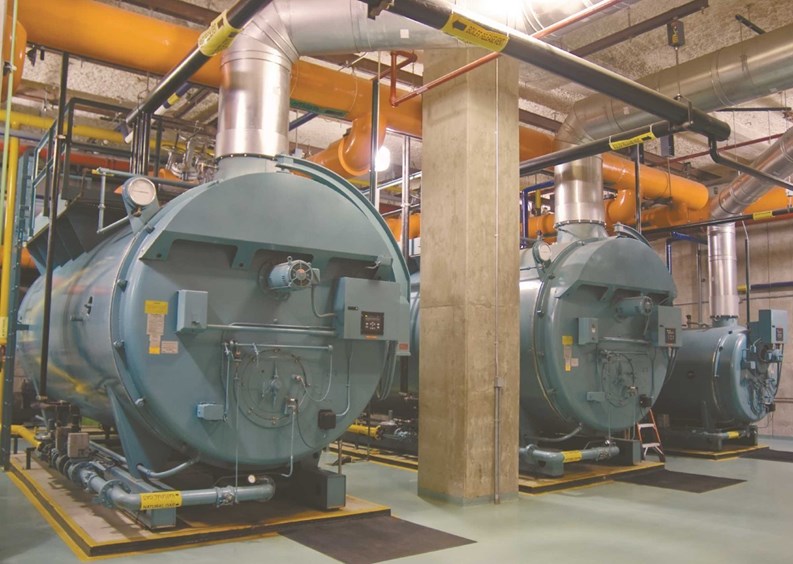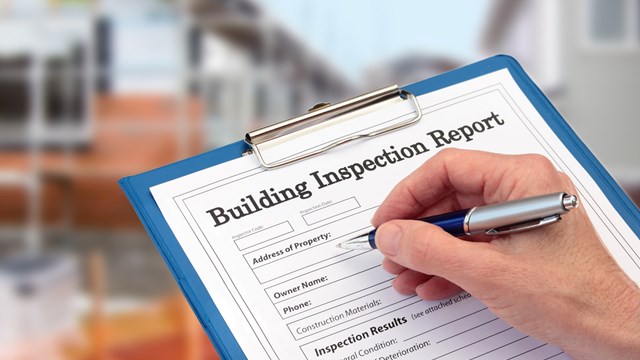Last summer’s heat wave is just a fading memory, and it's that time again: time to get your building’s boiler operating and ready for the colder months. Before the first snow falls however, some maintenance and housekeeping to your building's boiler and boiler room may be in order.
To most non-professionals, what’s in the boiler room is a mystery. The area can also be dangerous—it can lead to accidents if it's not kept secure from children and other unauthorized persons. Mysterious or not, the boiler is one of the most important pieces of equipment in any apartment building, since everyone needs heat and hot water, especially in the winter.
That’s why it’s important to make sure your boiler is in top operating condition before heating season settles in—you don’t want undetected minor problems to develop into sudden catastrophes. Also, in today’s economy, whether you’re using natural gas or home heating oil, you want to make sure your boiler is operating in as energy-efficient a manner as possible.
Developing Problems
Boilers can develop many problems over the years. One of the most common are tube leaks, resulting from a lack of regular cleaning and a lack of regular treatment. Milt Schatzer, service manager of Aggressive Energy & Mechanical Group in Brooklyn, says a lack of chemical treatment causes this problem. “Any cold water or fresh water coming into the boiler causes tube rot,” he says. “It’s costly—you will have to replace the tubes.”
Carbon buildup, another problem, is often found in boilers that burn oil. Correcting this can lead to lower harmful exhaust emissions and lower maintenance costs.
A low-water condition inside the boiler can lead to any number of problems. If there is too little water in the boiler, the low-water cutoff will shut the burner down. If, because of some malfunction, the burner fires in an empty boiler, the boiler will begin to melt.
Richard Berger, president of Brooklyn-based New York Boiler, Inc., adds that a lack of regular cleaning and water treatment can lead to a deterioration of the bottom of the boiler because “sediment accumulates and corrodes the steel if it is not flushed out of the boiler regularly.”
And Richard Blaser, president of New Rochelle-based Atlas Welding & Boiler Repair, feels that the primary problem in boilers is water leaks. If the leaks, which are caused by corrosion, are not taken care of immediately, they result in other major problems, such as a cracked or deteriorated high-temperature refractory (a wall made of a material such as tile and used for insulation).
How long should a boiler last? A steel boiler should last at least 20 years, and in many cases, longer. According to the pros, there are some boilers in the city that have been operating 80 years or more. “I worked on a boiler in a church recently that was 90 years old,” says Berger. To use another famous example, Pratt Institute in Brooklyn has had the same boilers chugging away since 1953.
Boiler Inspections
Every boiler needs to be inspected and serviced at least once a year, with some needing more frequent inspections, depending on their age and level of use. “If a boiler’s used for heating and making hot water—your typical apartment house boiler—it should be inspected a few times a year,” says Berger. Schatzer recommends two cleanings a year—a major one just before the heating season, and one afterward.
Inspections are key, says Phil Kraus of Manhattan’s Fred Smith Plumbing & Heating. “You should call up your boiler/burner person. Every year there should be an annual inspection of the boiler/burner and all the controls on the boiler and any heating controls, which regulate the steam going to the building, if it's a steam building.”
Secondly, if it's an HVAC building where you’d be regulating the steam going to the heat exchanger creating the hot water, you have to check any controls that are either steam-related or hot-water related, Kraus adds. The boiler, the burners, and the controls all must be inspected and maintained, he says. Also, if there are any pumps related to the hot water—again this isn't necessarily boiler, it's the heating system—but the pumps should be inspected.
The tubes in the boiler should also be cleaned, he says. And the water side of the boiler, which hardly anybody ever looks at, should be checked, too. “You should take apart the back of the boiler and empty the water out of the boiler and make sure everything looks okay on the inside—the boiler's in good repair and so forth.”
Unofficial maintenance calls are only part of the whole picture, however. According to Department of Buildings (DOB) spokeswoman Carly Sullivan, by law low-pressure boilers in buildings with six or more apartments must be inspected every year by a licensed oil-burner equipment installer, a licensed high-pressure boiler-operator, a licensed master plumber or an insurance-company representative qualified by the state Department of Labor. High-pressure boilers must be inspected internally and externally by the DOBs’ Boiler Division staff or an authorized insurance company rep qualified by the state Department of Labor.
Most apartment-house boilers are low-pressure, says Sullivan. High-pressure boilers are used more for applications where high-pressure steam is needed, like hospitals or industrial plants that entail drying.
According to Schatzer, those who perform typical boiler maintenance or inspections receive training from manufacturers and from their union—in the case of Aggressive, its workers are represented and trained by Local 638, the Metal Trades branch of the Steamfitters’ union.
What They Look For
Typical points included in an annual boiler inspection, says Sullivan, are a review of safety devices on the boiler, the flue to the chimney, the combustion air supply and the condition of the room enclosing the boiler itself.
In an inspection for a typical apartment-building low-pressure boiler, says Berger, technicians make sure the burner operates correctly, look for leaks, see if the boiler’s been cleaned enough, look at the boiler refractory, the combustion chamber, the front walls and the burner throats [a throat is an opening in the wall of a boiler furnace in which a burner is set].
“Also, the manhole and hand-hole gaskets [opening into the boiler] could leak,” he adds.
“Anything opening into the boiler sealed with a gasket can leak. They dry out over time, they seep water, and the boiler starts to deteriorate. If they aren’t changed often enough, you end having to change the manhole ring.” A gasket, for those who don’t know, is a seal around two matching openings, usually made of pliable material such as plastic or rubber. The compressor and lube tanks must also be checked so as to avoid contamination, according to Schatzer. His checklist also includes wiring—problems with the wiring could lead to a short circuit.
Sullivan adds her own list of problems that can come to light during an inspection: combustible materials being stored in the boiler room (a no-no for obvious reasons); holes in the ceiling and walls of the boiler room; corrosion of the flue pipe; water/steam leaks; the pipes and flue not being properly supported; or the safety relief valve is not “piped down” to a location near the bottom of the boiler as it should be. This valve is very important because it keeps the boiler pressure from becoming too high by discharging excess pressure when necessary and running the steam or hot water down to the floor to drain away.
All in all, Sullivan says the DOB’s boiler-inspection form lists 53 “boiler inspection defects,” with eight suggested remedies. These problems that must be corrected within 45 days of detection, or buildings risk fines and other penalties.
So clearly, there’s a lot that can go wrong within your boiler room.
Maintenance Schedule
Of course, a boiler serving a large apartment building doesn’t only need regular inspections—it needs a constant maintenance schedule. Most boiler repair and maintenance firms have checklists that they distribute to their customers to help them stay on top of things.
New York Boiler, for example, gives customers maintenance, testing and inspection logs in which it specifies daily, weekly, and the most complicated, monthly checks. The items differ for steam-heating boilers and hot-water boilers (for example, “check low-water cutoff” appears only on the checklist for steam-hearing boilers), but some things are common to both—recording temperature, recording pressure, checking floor drains, checking stop valves, and observing the flame condition.
Atlas Welding and Boiler Repair also has a “maintenance list” with daily, weekly and annual tasks. Some of the items seem simple—“read water meter,” “check for any signs of leakage,” “make sure oil filters and air filters are kept clean” and “keep a log book in the boiler room.” However, these items are vitally important.
New Legislation to Affect Operating Costs?
In line with paying for annual maintenance, new legislation known as Local Law 43 aimed at boilers may soon put a dent in a building’s operating costs. In an effort to promote cleaner burning fuels in boilers, co-op and condo buildings will have to comply with new city and state regulations regarding biodiesel fuels and heating oils. The legislation, introduced in the City Council as Intro 194-A, does not require buildings to change over from No. 6 heating oil to No. 2, No. 4 or natural gas, according to Gene V. Pullo, president of Brooklyn-based Metro Energy. "It only requires that all heating oil including No. 2, No. 4 and No. 6 be blended with at least 2% biodiesel (B2) and sets a new lower sulfur standard for No. 4 oil (1,500 parts per million down from 3,000 parts per million)."
Pullo, for his part, is excited about this energy initiative. "This legislation was worked on for more than three years. It took that long to match the policy interests of the city, which wants greener buildings, with the economic realities in New York City," he says. Metro Energy is one of a number of companies assisting buildings with competitive pricing, Pullo says. Combined with a New York State tax credit for residential buildings, Metro is currently providing up to B20 on No. 2 and No. 4 oil—that's 20% biodiesel—to building owners at a "cost savings," according to Pullo. The market will adapt to a lower sulfur No. 4 oil, Pullo explains.
Bill Jebaily, president of Aggressive Energy & Mechanical Group, also believes the state incentives will save buildings money. "Buildings will be able the recoup that 2%. We are in the energy business, so we deliver anywhere from 2% B2, which is 2% bio-fuel, to B20, which is 20% bio-fuel. And there is an added cost. Say B2 is maybe anywhere from 1 to 2 cents more to purchase from the oil company but the state is refunding that back at the end of the year, where they're giving you a tax break for that amount of money," he says.
A separate initiative being spearheaded by the Mayor's Office of Long Term Planning and Sustainability and the Department of Environmental Protection (DEP) may phase out No. 6 oil completely, but nothing has been announced as of yet, Jebaily says.
Resident Manager and Superintendent Peter Grech isn't as sure as the industry professionals. "Yes, there will be definitely an increase in cost. Especially if they limit or if they remove all heavy oil, such as No. 6 and No. 4 totally, and then we're only dependent on No. 2. Yeah, the heating cost then will go up, will go very high. Number 6, while it's the residual fuel, it's the dirtiest fuel there is. It is also the highest BTU content. And so if you remove that BTU content, you're stuck with No. 2."
The biggest cost associated with the changeover would be swapping out the burners, according to Grech. "It depends on the size of the burners and the boilers. If we were to change our No. 6 burners to No. 2 burners, it would cost us about $75,000 each burner. And then for the tank, the tank is not so bad. And the systems, it's a few thousand dollars. But the biggest cost is the burners."
While Grech believes that the legislation is good for the environment, who will bear the cost is anybody's guess. He hopes that it will not become too cost-burdensome to co-op and condo boards and residents. "Somebody has to pay for this. My question is who?"
While aware of cost concerns, Pullo doesn't see a major expenditure across the board and feels that any changeover to a new type of heating oil should be seamless. The legislation goes into effect in October 2012.
What the Super Can Do
Getting back to routine maintenance, some boiler problems are simple enough to be handled by your super or maintenance staff. The super can open doors, measure stack temperatures, see if the gaskets are beginning to leak, and see when the refractory is beginning to go bad. Boiler maintenance training is available for superintendents.
On the other hand, says Berger, a professional would be needed to change boiler tools, do welding repairs, or do refractory repairs.
“Supers don’t even usually clean boilers today. The biggest bang for their [the users’] buck is to clean the boiler on a regular schedule. When they open the boiler room to clean it they will discover any problems that exist. Cleaning is the holy grail of boilers,” he says.
Blaser of Atlas Welding believes that what supers are able to do on their own depends on the particular super and their capabilities.
Don’t skimp on maintenance, warns Kraus. “In my own building where I'm on the board, every year we have the entire system checked. This is not a place where you want to save money. A lot of buildings have one boiler, and if the boiler goes down because you haven't maintained it, then you have an extraordinary expense of having a temporary boiler on the sidewalk, which can probably cost more than a new boiler. This is where you want to spend your maintenance dollars. There are other places but certainly, you don't want to cut back here.”
The “R Stamp”
If welding is to be performed in the course of repairs, the company doing the work must be certified to use the “R” (Repair) symbol stamp by the National Board of Boiler and Pressure Vessel Inspectors. In order to perform R stamp welding and repairs, professionals are tested and certified in the quality of their weld joints through a rigorous testing procedure.
Both the company and the worker need to be certified. If, for example, a certified welder leaves his employer, he’s still certified but only if he is now working for another company that also has an R stamp.
Maintenance Calls and Overhauls
How long a boiler inspection or maintenance call takes depends on the job being done. Berger says that if a customer calls before the start of the heating season asking his company “to take a look,” it could be “half an hour to an hour in the boiler room.”
On the other hand, a basic overhaul, including opening up the boiler, scraping down the burner housing, changing parts, painting the unit and resetting the equipment to factory standards, could take around six hours, says Schatzer. If there are several boilers in your boiler room, of course, this could vary.
Many boiler companies don’t charge for an initial inspection and give free estimates, but they do charge for the work that comes out of that inspection.
As far as the aforementioned major overhaul is concerned, Schatzer estimates that it would cost somewhere in the neighborhood of $1,500.
As with any major building component, being proactive is always preferable to playing catch-up. Don’t wait until it’s too late for your boiler to be inspected—no one wants to live in a freezing building with no heat or hot water, even on a temporary basis. Make sure you have a good relationship with your heating professional, and make that appointment soon, if you haven’t already.
“The main thing I would recommend to any manager or a co-op board,” says Blaser, “is to make sure that the building staff is checking the boiler regularly, and that as soon as they find something wrong, they either fix it or have a professional fix it. None of these problems will get better—they will only get worse.”
If properly cared for and maintained, a boiler can do its job for decades. However, as the weather changes, different demands are put on your building’s boiler. So it’s important that your boiler be well-maintained and running properly for optimal output. If you wait to call your boiler professional until the onset of winter for a cleaning and inspection, it could be too late.
Raanan Geberer is a freelance writer and editor living in New York City.







Leave a Comment